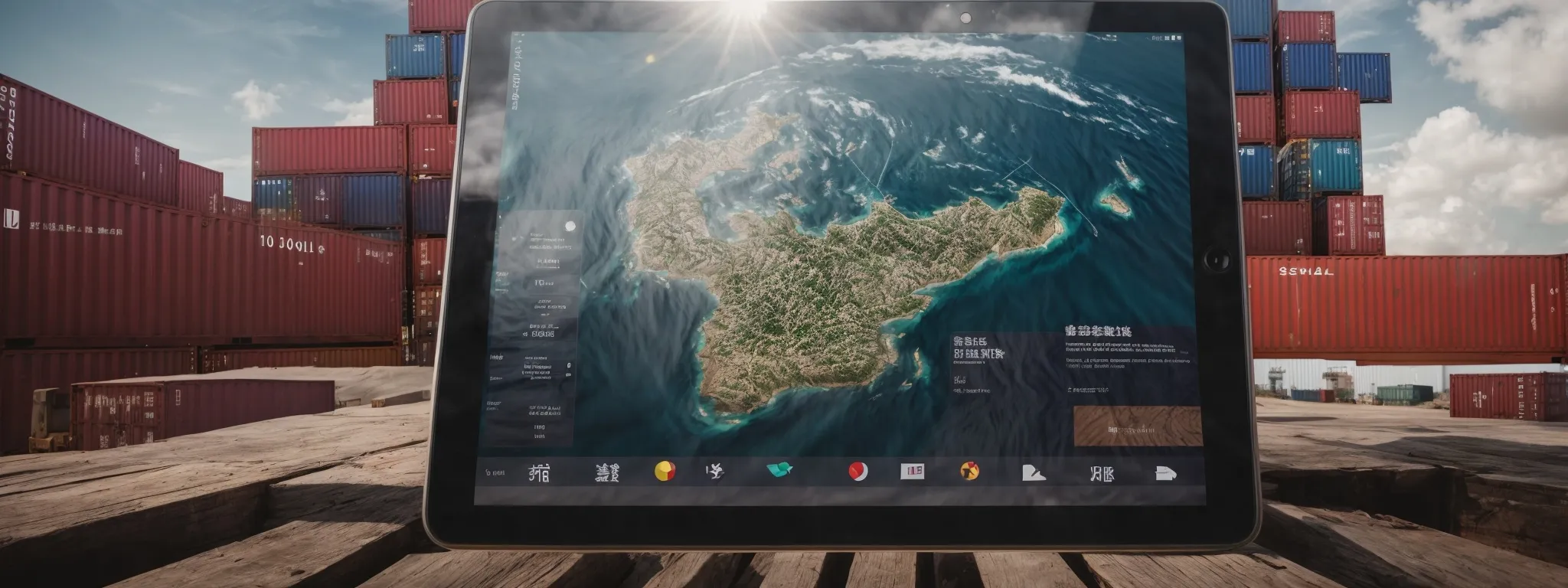Navigating International Sales and Cross-Border Commerce
In a world where boundaries blur with each passing transaction, mastering the art of international sales becomes imperative for businesses seeking global dominance.
As merchants weave through complex webs of international trade laws and cultural nuances, the success of their export transactions hinges on both strategic acumen and a thorough understanding of market dynamics.
Crafting a robust international sales strategy requires meticulous research, tailored marketing plans, and a deft hand at negotiation.
Optimal logistics and the deployment of leading-edge technology ensure that every sale contract upholds the reputation of the franchisor, manufacturer, or supplier.
Keep reading to discover the keys to unlocking prosperous cross-border commerce and cultivating lasting relationships with clients the world over.
Mitigating Risks in Global Supply Chain
- Understanding Cultural Nuance and Customer Behavior Is Essential for Global Franchise Expansion
- Companies Must Adapt to Shifting Global Economic Trends and Apply Incoterms Correctly for Successful International Trade
- Technological Innovation Is Crucial in Facilitating Efficient International Transactions and Customer Engagement
- Protecting Intellectual Property and Navigating Legal Frameworks Are Key to Sustainable International Growth
- Participation in Trade Shows and Networking Events Strengthens International Relationships and Market Presence
Understanding Global Market Trends for Effective Commerce

As the world becomes increasingly interconnected, professionals navigating the multifaceted realm of international sales and cross-border commerce must possess a nuanced understanding of the dynamic forces at play.
At the heart of this lies an in-depth comprehension of global market trends which equips franchisors, franchisees, and independent business owners alike with the discernment necessary to capitalize on international sales contracts.
This encompasses dissecting and analyzing international consumer behavior, being agile in response to the ebb and flow of global economic shifts, swiftly adapting to the relentless pace of technological advancements, and astutely identifying and engaging with burgeoning markets.
These elements are the bedrock allowing companies to not only stay afloat but thrive in the ever-evolving waters of international trade and commerce.
Analyzing International Consumer Behavior
Grasping the patterns in which international customers engage with brands stands as a cornerstone for any franchise expanding into new territories. Astutely observing customer preferences, cultural nuances, and purchasing habits inform the strategies deployed by franchisees and franchisors to optimize their brand’s global footprint.
Contemporary commerce necessitates that seller representatives transcend traditional boundaries, leveraging data to fine-tune their approach toward distinct international markets. This involves the incorporation of factors such as local customs and communication styles into the sales process, further steeping company representatives in the art of international consumer engagement.
Keeping Up With Global Economic Shifts
Maintaining currency with global economic trends is a non-negotiable facet of international trade operations. A company’s capacity to adjust to fluctuations in market conditions, currency exchange rates, and economic policies can make the difference between a thriving enterprise and one that struggles to maintain its foothold.
As transformative trade agreements are forged and economies wax and wane, the astute business will keep its finger on the pulse of international relations and fiscal patterns. It’s through this vigilance that franchisors and franchisees preserve the competitive edge in a tapestry of global transactions:
- Monitoring shifts in supply and demand curves across different markets
- Understanding and applying Incoterms in logistics and shipping agreements
- Adjusting sales strategy to align with regional economic health and consumer confidence
Adapting to Technology Changes Worldwide
Embracing technological innovation propels franchisors and franchisees forward in the intricate dance of global commerce. Representatives who harness cutting-edge digital tools and platforms can facilitate seamless transactions, foster robust communication channels, and provide a level of customer service that resonates across borders.
For the contemporary operator, staying ahead of technological trends is more than a convenience—it’s an imperative that shapes international sale agreements and the ultimate success of the brand. A franchise’s ability to integrate emerging technologies into its business model serves as a litmus test for its adaptability and longevity in the international marketplace.
Recognizing Emerging Markets for Expansion
Identifying and harnessing the potential of emerging markets stands as a pivotal chapter in the chronicle of a franchise’s expansion narrative. Franchise players must not only track demographic shifts but also evaluate the economic infrastructure and regulatory frameworks to gauge the viability of establishing a franchise opportunity within an area.
For franchisors and franchisees, the cultivation of local partnerships can be instrumental in navigating the intricacies of new territories. Through these alliances, stakeholders attain critical insights into regional markets, enabling them to tailor their business models to resonate with local consumers and seamlessly align with the commercial tapestry of the destination.
Crafting a Robust International Sales Strategy

Mastering the complexities of international sales and cross-border commerce demands a well-honed strategy tailored to the intricacies of the global market.
It is incumbent upon businesses, whether a rising franchise or a venerable brand seeking fresh horizons, to meticulously identify and understand their target markets abroad.
Crafting a thorough market entry plan, as does the strategic establishment of robust sales channels and partnerships, becomes fundamental.
Moreover, localizing products and services to new markets’ specific tastes and requirements is pivotal in ensuring resonant appeal to diverse customer bases.
Each detailed step is a critical part of a symphony played by organizations looking to transcend their domestic confines and embrace the rich tapestry of international business.
Identifying Target Markets Abroad
Determining target markets abroad involves an intricate assessment of global demographics and consumer trends. Brands expand their reach by evaluating which regions have the most receptive potential customer base for their product or service.
Decisive and thorough analysis of market data, paired with cultural and social insights, positions companies to strategically enter and influence international landscapes. Pioneers in this endeavor assess not just current market conditions but forecast future trends, setting the stage for sustainable international growth:
| Market Analysis | Cultural Insights | Consumer Trends | Forecasting |
|---|---|---|---|
| Identify receptive markets | Determine cultural compatibility | Analyze buying behavior | Predict market potential |
Developing a Market Entry Plan
Entering a new international market is a significant milestone necessitating meticulous planning and swift execution. A market entry plan acts as a roadmap, providing a strategic approach for introducing a company’s product or service to a foreign market while considering multifaceted elements of the new environment.
The plan outlines the objectives, strategies, and actions required to penetrate the market effectively, detailing a thorough analysis of local competitors, an appraisal of potential barriers to entry, and the estimation of initial investment and ongoing operational costs:
- Conduct a comprehensive market analysis and competitive research.
- Assess legal and regulatory requirements for market entry.
- Strategize market penetration tactics, including marketing, sales channels, and product positioning.
- Calculate preliminary financial projections and funding necessities.
- Develop contingency plans to address possible challenges and market shifts.
Execution of this franchise opportunity is pivotal to a company’s capacity to establish a firm presence in the market, engaging customers and carving a niche amidst local and established international competitors.
Establishing Sales Channels and Partnerships
Forming sales channels and securing strategic partnerships are pivotal endeavors for businesses aiming to expand their global reach. These arrangements enable franchisors and franchisees to distribute their products and services efficiently, leveraging the expertise and infrastructure provided by their local counterparts to navigate the complexities of new markets and customer bases.
Building such alliances involves detailed negotiations and the drafting of international sales contracts that articulate the mutual responsibilities and goals of each party. Critical to the success of a franchise opportunity, these collaborations enhance market penetration, amplify brand visibility, and champion the company’s values and mission within the foreign ecosystem.
Localizing Products and Services for New Markets
Localizing products and services for new markets is a critical step for entities forging paths into diverse international landscapes. Companies tailor offerings to align with regional tastes, customs, and regulatory requirements, transforming their business operation into one that does not just exist but thrives in the target locale.
Through localization, a brand ensures its value proposition resonates with a foreign audience, thereby enhancing customer experience and fostering loyalty. This strategic modification bolsters the brand’s relevance and appeal, serving as a bridge between company offerings and customer expectations in varied cultural milieus.
Navigating Legal and Regulatory Hurdles in Cross-Border Sales

For any enterprise venturing into the vibrant but complex theater of international sales and franchise expansion, mastery over legal and regulatory frameworks is a non-negotiable prerequisite for sustained growth. International sales contract templates provide a useful framework for establishing a clear agreement between the seller and buyer, while the United Nations Convention on Contracts for the International Sale of Goods (CISG) serves as a comprehensive set of rules governing the international sale of goods.
The agility to interpret and comply with an intricate web of trade agreements, export controls, and local statutes spells the difference between lucrative opportunities and costly missteps.
Companies must navigate this juridical labyrinth, ensuring each international sale contract adheres to the varying laws and safeguards intellectual property rights across diverse jurisdictions.
Knowledge isotopes, reflecting a company’s understanding of legal nuances, can bind the very atoms of a successful cross-border operation or trigger a breach that unravels meticulously constructed business connections.
Simple Template of International Sales (This is just an example)
INTERNATIONAL SALES CONTRACT
This Sales Contract (“Contract”) is entered into on [Enter Date] by and between:
Seller:
Name: [Seller’s Full Legal Name]
Address: [Seller’s Full Legal Address]
Represented by: [Name and Title of Authorized Representative]
Buyer:
Name: [Buyer’s Full Legal Name]
Address: [Buyer’s Full Legal Address]
Represented by: [Name and Title of Authorized Representative]
WHEREAS, the Seller agrees to sell, and the Buyer agrees to buy, the goods under the terms and conditions set forth below:
Description of Goods:
[Detailed description of the goods, including technical specifications, standards, and quality requirements.]
Quantity:
[Specify the quantity of goods.]
Price:
Total Price: [Specify the total contract price in the agreed currency.]
Payment Terms: [Detail the payment method and schedule.]
Delivery:
Delivery Terms: [Specify delivery terms, referencing Incoterms 2020 (e.g., FOB, CIF).]
Delivery Date: [Specify the date or period for delivery.]
Place of Delivery: [Specify the place of delivery.]
Documents:
[List all necessary shipping and transaction documents.]
Inspection:
[Terms regarding the inspection of goods before shipment.]
Warranties and Guarantees:
[Detail any warranties or guarantees offered by the Seller.]
Liabilities and Insurance:
[Specify liabilities of each party and details about insurance, if applicable.]
Force Majeure:
[Clause covering unforeseeable events affecting contract fulfillment.]
Arbitration:
Arbitration Agreement: Any dispute, controversy, or claim arising out of or relating to this contract, or the breach, termination, or invalidity thereof, shall be settled by arbitration in accordance with the Rules of Arbitration of the International Chamber of Commerce.
Arbitration Location: The place of arbitration shall be Paris, France.
Number of Arbitrators: [Specify the number of arbitrators, usually one or three.]
Language of Arbitration: [Specify the language to be used in the arbitral proceedings.]
Governing Law: This contract shall be governed by and construed in accordance with the laws of [Specify Jurisdiction].
Confidentiality:
[Terms regarding the confidentiality of contract terms and any sensitive information.]
Termination:
[Conditions under which the contract may be terminated.]
Miscellaneous:
[Include any other terms and conditions mutually agreed upon.]
Signatures:
This Contract is signed by the duly authorized representatives of the Seller and Buyer.
Seller:
Name: _______________
Title: ________________
Signature: ____________
Date: ________________
Buyer:
Name: _______________
Title: ________________
Signature: ____________
Date: ________________
Comprehending International Trade Agreements
Delving into the expanse of international commerce, the astute business entity must become versed in the various international trade agreements that govern the seas of cross-border transactions. Companies must become adept at dissecting the intricate fabric of these accords to position themselves favorably within the global marketplace. The United Nations Convention on Contracts for the International Sale of Goods (CISG) provides a framework for international sale contracts, ensuring fair practices between buyer and seller.
Such trade agreements often encompass treaties like the United Nations Convention on Contracts for the International Sale of Goods (CISG), which offers a collective framework for the sanctity of sales contracts. Mastery of these foundational elements assures that all transactions align with international standards and fosters trust between contracting parties:
- Understand vital international legal principles and how they apply to sales agreements.
- Incorporate treaties like the CISG into the architecture of contracts to ensure uniformity.
- Employ due diligence in understanding the scope and limitations imposed by different agreements.
Understanding Export Controls and Sanctions
Navigating export controls and sanctions looms as a crucial consideration for enterprises engaging in international sales. Afforded with no luxury of ignorance, companies must thoroughly acquaint themselves with the complex landscape of international sanctions and export regulations that vary by country and commodity.
Whether one operates a fitness franchise branching out internationally or a supplier looking to export goods, vigilance in export documentation and compliance is cardinal. Missteps in this realm can lead to severe repercussions, including financial penalties and damage to the company’s reputation.
Ensuring Compliance With Local Laws and Regulations
Ensuring compliance with local laws and regulations is a critical aspect for any franchisor or independent company aiming to operate successfully within international borders. Each jurisdiction bears its unique legal fabric, encompassing a myriad of regulations that can affect everything from a franchise’s initial establishment to its daily operation and governance.
It is incumbent upon organizations to seek guidance from legal experts who specialize in international commerce to steer clear of regulatory pitfalls. This form of due diligence not only fortifies a franchise’s legal standing but also paves the way for smooth business transactions and foundation laying in new markets.
Managing Intellectual Property Across Different Jurisdictions
Securing intellectual property rights in foreign territories is a critical maneuver that franchisors and international businesses cannot afford to overlook. With differing approaches to intellectual property across international borders, vigilant protection of trademarks, patents, and copyrights becomes essential to sustaining a brand’s integrity and competitive edge abroad.
Effective management of intellectual property involves strategic planning and proactive measures to affirm ownership and enforce rights within each respective jurisdiction. An enterprise’s capacity to mitigate the risk of infringement and unauthorized use of its intellectual assets is integral to maintaining a stronghold in the global marketplace and safeguarding future growth.
Optimizing Logistics and Supply Chain for International Trade

In the intricate arena of international sales and commerce, strategic optimization of logistics and supply chain operations stands as a formidable pillar for ensuring a seamless flow of goods across borders.
Companies must adopt effective transportation and shipping methods to pivot with the agility required in a globalized economy.
As risks within the supply chain multiply due to geographical and political complexities, a proactive stance in risk management becomes essential.
Sophisticated technological tools emerge as game-changers, offering unprecedented visibility and control over the intricate networks that undergird international trade.
Moreover, constructing a resilient logistics infrastructure helps businesses withstand unforeseen disruptions, securing their place in the competitive global market.
As franchises and corporations unfurl their operations over various continents, astute oversight of these logistical and supply chain dynamics is requisite for maintaining a robust and responsive international commerce strategy.
Selecting Efficient Transportation and Shipping Methods
Selecting efficient transportation and shipping methods is critical for businesses engaged in international trade to ensure the timely and cost-effective delivery of goods. Companies must weigh options like air freight for time-sensitive shipments against sea transport, which offers scalability for larger cargo but with longer transit times.
Moreover, understanding and applying the right Incoterms – a set of international shipping rules published by the International Chamber of Commerce – is crucial in clarifying the responsibilities of exporters and importers regarding the delivery of goods:
| Transportation Method | Benefits | Considerations | Applicable Incoterm |
|---|---|---|---|
| Air Freight | Speed | Cost, Sustainability | CIP (Carriage and Insurance Paid To) |
| Sea Transport | Economical for Volume | Transit Time, Port Infrastructure | FOB (Free On Board) |
Mitigating Risks in Global Supply Chain Management
In a spectrum as vast and volatile as international trade, businesses must pre-empt and strategize against supply chain risks to sustain their competitive momentum. A proactive approach to risk management, incorporating real-time monitoring systems and diversifying supplier bases, can significantly reduce the vulnerability of global operations to disruptions and ensure continuity of supply.
Central to the supply chain’s resilience is the meticulous crafting of contingency plans that outline actionable strategies in response to potential crises. Whether tackling force majeure events or navigating geopolitical tensions, companies that invest in agile and adaptive supply chain structures position themselves to weather uncertainties with grace and strategic foresight.
Leveraging Technology for Supply Chain Visibility
Embracing technological innovation is a vital step for businesses aiming to enhance supply chain visibility in international trade. Sophisticated software solutions enable companies to track goods in real time, anticipate delays, and manage inventory levels with unparalleled precision.
Investment in advanced technology platforms facilitates the transition from reactive to proactive logistics, empowering businesses with data analytics and predictive modeling to optimize supply chain performance. This strategic use of technology helps firms adapt to the complexities of global commerce, ensuring they meet delivery commitments and maintain customer satisfaction.
Building Resilience in International Logistics
Building resilience within international logistics mandates an adaptive approach, one that hinges on a company’s capacity to anticipate and react to the logistical challenges inherent in cross-border commerce. A rigid logistics model presents vulnerabilities; therefore, an enterprise must streamline its operations, ensuring efficiency and robustness amidst the flux of international trade.
Companies that establish resilient logistics frameworks are adept at identifying potential chokepoints and implementing alternate routing strategies to circumvent them. They invest in a network that supports a flow of goods that can withstand the pressures of variable global demands and maintain the integrity of the supply chain, regardless of external disruptions.
Leveraging Technology for Seamless Cross-Border Transactions

In an era where digital capabilities dictate the success of cross-border engagements, businesses must integrate advanced technology to navigate the complexities of international sales and commerce.
A multitude of tools and platforms exist to support organizations as they expand globally, each tailored to streamline various facets of the sales process.
From utilizing sophisticated e-commerce platforms that open doors to global sales to implementing cross-border payment solutions that secure transactions in multiple currencies, the technology at our disposal is reshaping how businesses operate on an international scale.
Moreover, managing the intricacies of multi-currency pricing and foreign exchange risks becomes less daunting with the right financial tools, just as customer relationship management (CRM) systems become pivotal in delivering exceptional service to an international customer base.
Embracing these technological advancements provides businesses with the agility and precision required to flourish in the global market.
Utilizing E-Commerce Platforms for Global Sales
Global sales are being revolutionized by the strategic deployment of e-commerce platforms that enable businesses to overcome geographical barriers and reach a wider audience. These platforms not only streamline the online shopping experience for customers but also equip franchisors and franchisees with sophisticated tools to manage inventory, process payments, and oversee logistics with efficiency and ease.
The acceleration of e-commerce platform adoption across a variety of industries signifies a shift in how international sales are conducted, providing a robust framework for transactions that transcend borders. Companies that integrate these digital storefronts into their sales strategy unlock new potential to grow their market share and nurture a global brand presence without being tethered to physical locations.
Implementing Cross-Border Payment Solutions
Implementing cross-border payment solutions is a pivotal move for businesses seeking to streamline international transactions. These solutions provide secure and efficient methods for handling payments in multiple currencies, thereby reducing transaction costs and mitigating the risks associated with currency fluctuations.
By adopting these advanced payment mechanisms, enterprises enhance their capability to conduct business with international clients, offering flexible payment options that cater to the diverse financial landscapes and preferences of their global customer base.
Managing Multi-Currency Pricing and Forex Risk
Effective management of multi-currency pricing is critical for businesses operating internationally to protect margins and remain competitive. Adroit pricing strategies account for exchange rate volatility while offering price stability to customers, safeguarding a company’s revenue streams against the whims of forex markets.
Forex risk management requires a keen understanding of financial markets and the application of hedging strategies to buffer against currency fluctuations. Enterprises engaging in international commerce routinely execute financial instruments such as forward contracts or options to lock in exchange rates, ensuring predictable costs and revenues in their financial forecasting.
| Aspect | Risk Mitigation Strategy | Financial Instrument |
|---|---|---|
| Multi-Currency Pricing | Dynamic Pricing Models | Options |
| Forex Risk | Exchange Rate Lock-Ins | Forward Contracts |
Employing CRM Systems to Handle International Customers
Integrating CRM systems into the fabric of an international sales strategy enables businesses to manage relationships with a diverse customer base spread across the globe. Companies can capture and analyze customer data from various touchpoints, ensuring that every interaction is tailored and relevant, regardless of cultural or geographic divides.
These systems facilitate the segmentation of international clientele, allowing companies to craft personalized marketing campaigns and service offerings. By implementing CRM solutions effectively, organizations bring precision and personalization to customer engagements, fostering loyalty in a competitive international market:
| CRM Component | Customer Data Management | Customer Segmentation | Marketing Personalization |
|---|---|---|---|
| Objective | Compile and Analyze Global Customer Interactions | Classify Customers by Region and Preferences | Tailor Campaigns to International Market Segments |
Cultivating Relationships With International Clients and Customers

In the grand chess game of international sales and cross-border commerce, the relationships fostered with clients and customers across the globe serve as a kingmaker in the pursuit of enduring success.
Beyond the mere exchange of goods and services, cultivating genuine connections demands an exquisite balance of cultural understanding, language proficiency, and clear communication.
Franchisors and corporations alike stand to gain immensely from mastering the delicate art of international business etiquette, providing support that transcends linguistic barriers, and participating actively in trade events that facilitate invaluable networking opportunities in the field.
This strategic alliance of human touch with professional acumen forms the crux of not just winning a sale but nurturing an enduring global partnership.
Understanding Cultural Nuances and Business Etiquette
In the labyrinth of international commerce, success hinges not just on the quality of goods or services but also on the subtleties of cultural understanding and adherence to business etiquette. Franchise corporations and independent ventures alike must deftly navigate the social intricacies of diverse markets, tailoring their approaches to honor local customs and business practices while fostering deep, respectful relationships with international clients and patrons.
These cultural competencies are paramount for sales representatives and franchise owners who seek to build trust and foster collaboration with international partners. Cultivating a rich awareness of the cultural mosaic of the global marketplace gives these professionals an edge, allowing them to align communication strategies and negotiation techniques with the expectations and norms of each specific culture:
| Key Component | Strategic Focus | Expected Outcome |
|---|---|---|
| Cultural Understanding | Honor Local Customs and Business Practices | Builds Trust and Respect |
| Business Etiquette | Align Communication and Negotiations with Cultural Norms | Fosters Collaboration and Partnership |
Providing Multilingual Customer Support
In the realm of international sales, multilingual customer support stands as a pivotal aspect of success. It allows brands to render assistance and engage effectively with a diverse client base, transcending language barriers to provide seamless service and support.
- Invest in training and resources to develop a multilingual support team.
- Implement technology such as translation software to enhance communication.
- Establish multilingual customer service protocols to ensure consistent, accurate support.
Through the provision of multilingual support, companies demonstrate a commitment to inclusivity and customer-centric service. This strategic initiative not only nurtures customer loyalty but also positions the brand as an accessible and considerate player in the global market.
Building Trust Through Consistent and Transparent Communication
In the theater of international commerce, constructing trust between parties necessitates a bedrock of consistent and transparent communication. Clear dialogue and openness in all dealings fortify the reputation of a franchise as trustworthy, laying the groundwork for durable international partnerships and repeat business.
Transparent communication not only dissolves ambiguity but underpins the building of long-lasting relationships with clients and customers from diverse cultural landscapes. Through regular updates, truthful representation of products and services, and a willingness to address concerns, franchises cement their standing as reliable partners in the eyes of their international clientele.
- Engage in open dialogue with clients to foster trust and clarity.
- Provide accurate, honest information about products and services to ensure expectations are met.
- Maintain a practice of addressing and resolving concerns swiftly to demonstrate commitment to customer satisfaction.
Attending International Trade Shows and Networking Events
Participation in international trade shows and networking events emerges as an invaluable strategy for any franchisor or corporation eager to forge substantive connections in the global marketplace. These gatherings serve as a platform for professionals to showcase their brands, discover insights into emerging trends, and engage directly with potential clients and customers.
By attending these global convocations, companies demonstrate a proactive commitment to international expansion while benefiting from in-person interactions that can solidify relationships far more effectively than any virtual meeting. Such events offer a rare opportunity for franchises and business owners to connect, exchange ideas, and potentially collaborate with international partners and competitors, cultivating a network that encapsulates diverse markets and opportunities.
Conclusion
Navigating international sales and cross-border commerce is imperative for businesses seeking to thrive in today’s interconnected global economy.
By gaining a deep understanding of international consumer behavior and staying adaptive to global economic shifts and technological advancements, companies can effectively capitalize on new opportunities.
Developing a solid strategy for market entry and forming strategic partnerships are key to establishing a strong international presence.
Moreover, businesses must adeptly manage the legal and regulatory aspects of international trade to avoid costly errors and protect intellectual property.
Optimizing logistics and leveraging technology aids in maintaining a resilient supply chain and seamless transactions across nations.
Finally, cultivating relationships with international clients through cultural understanding, multilingual support, and transparent communication is fundamental to building trust and achieving sustainable success in cross-border commerce.
Our team of attorneys are well versed into the domain of international sales and international trade. Contact our office today!


